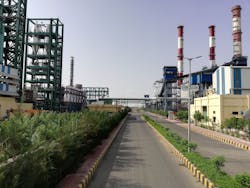Two years ago, Balkrishna Industries Ltd. (BKT) announced it was building a carbon black plant. The facility is on schedule to reach full capacity by 2021.
At the end of the first quarter of financial year 2019 ended June 30, the plant had a carbon black production output of 60,000 metric tons. That amount will increase to 80,000 tons in the second quarter, half of its projected full capacity of 130,000 tons.
The carbon black plant was built next to BKT's tire manufacturing plant, which produces radial off-the-road tires, including farm tires; a research and development center; and a test track. The entire complex is located on nearly 400 acres.
"This plant makes the difference and is definitely going to reward us," says Rajiv Poddar, joint managing director of BKT. "This significant $75 million investment (initially $23 million) provides vital raw material within the tire manufacturing supply chain.
"The decision to produce this component in-house is part of our strategy. Not only does the new plant provide us with manufacturing independence, but it also ensures a better quality of our raw materials, since we have now precise upstream control over the entire process."
Around 50% of the carbon black produced at the new plant is being used in BKT’s tire manufacturing process, while the other remaining 50% is sold on the open market. In addition, 80,000 tons of the present production are in hard grade; further production capacity for 50,000 tons in soft grade is under commissioning, says the company.
"The vertical integration of carbon black in the tire production process is hence another step forward in the development of the Bhuj production site, which was inaugurated back in 2015, and has been planned for enduring expansion in order to respond to the ever-growing demand for tires."
BKT also has announced the intention to increase its global market share in the off-highway tire segment by raising its current figure of 6% to 10% by 2025.



